Every dog drools — it’s a normal part of how their mouth functions. Saliva helps them chew, swallow, and digest food. But when that saliva starts dripping constantly from their lips, it can be concerning.
Drooling in dogs can range from harmless anticipation of a meal to a sign of something serious, like heatstroke or poisoning.
Here’s how you can tell normal vs abnormal drooling in dogs, what causes it, and when to call your vet.
When Is Excessive Drooling Normal in Dogs?
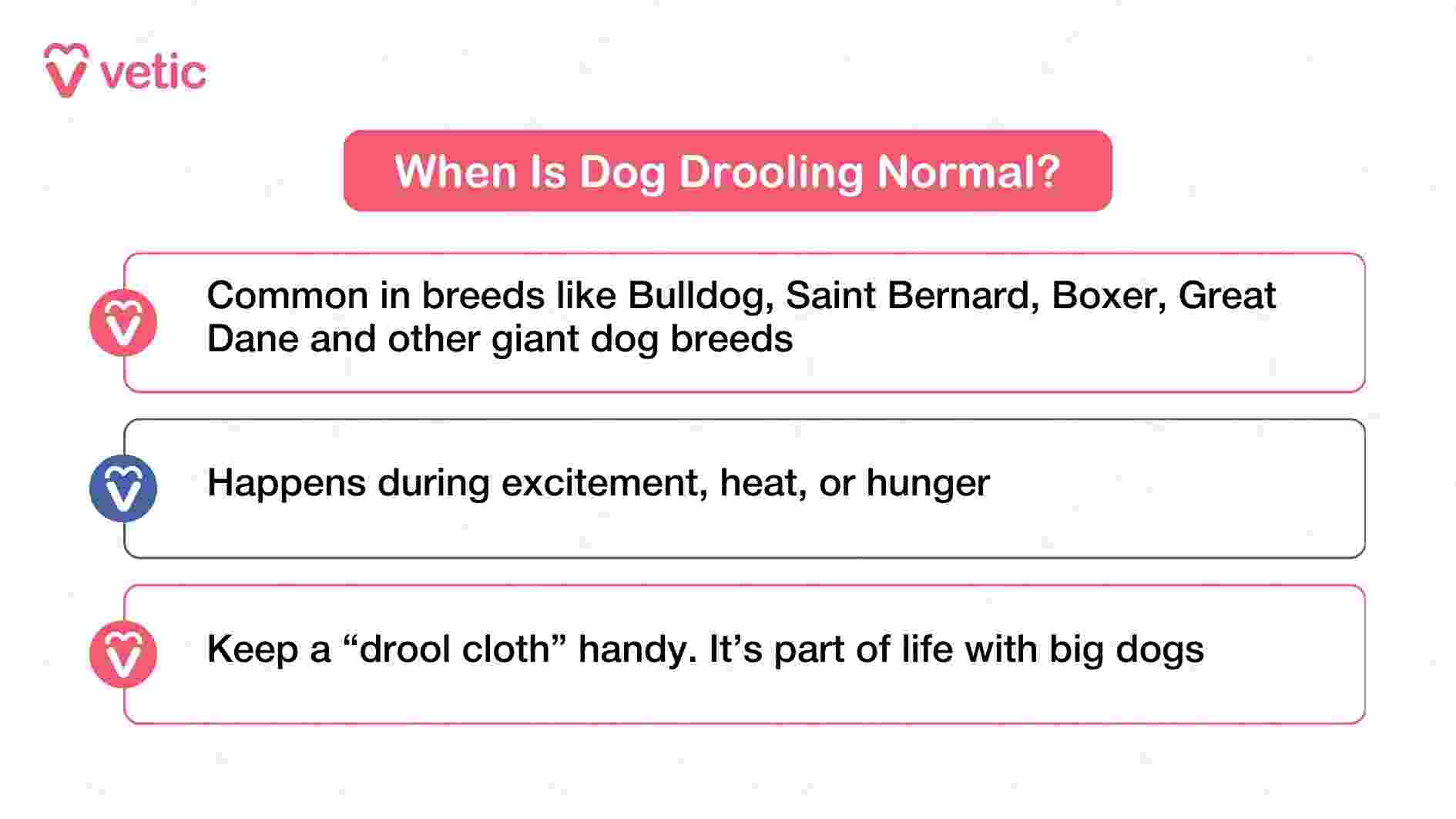
Some breeds are naturally heavy droolers. Dog breeds that drool excessively include Labrador Retriever, Saint Bernard, Bullmastiff, Boxer, Great Dane, and Bulldog. These breeds have loose lips and extra folds around the mouth that trap saliva, making it drip frequently, especially when they’re excited or eating.
If your pet belongs to one of these breeds, a little slobber is normal. Just keep a soft towel or “drool rag” handy, it’s part of life with a big, happy dog!
What Are Some Normal Reasons Dogs Drool More Than Usual?
While breed-related drooling is common, certain everyday scenarios can also trigger excessive salivation in dogs that isn’t linked to illness.
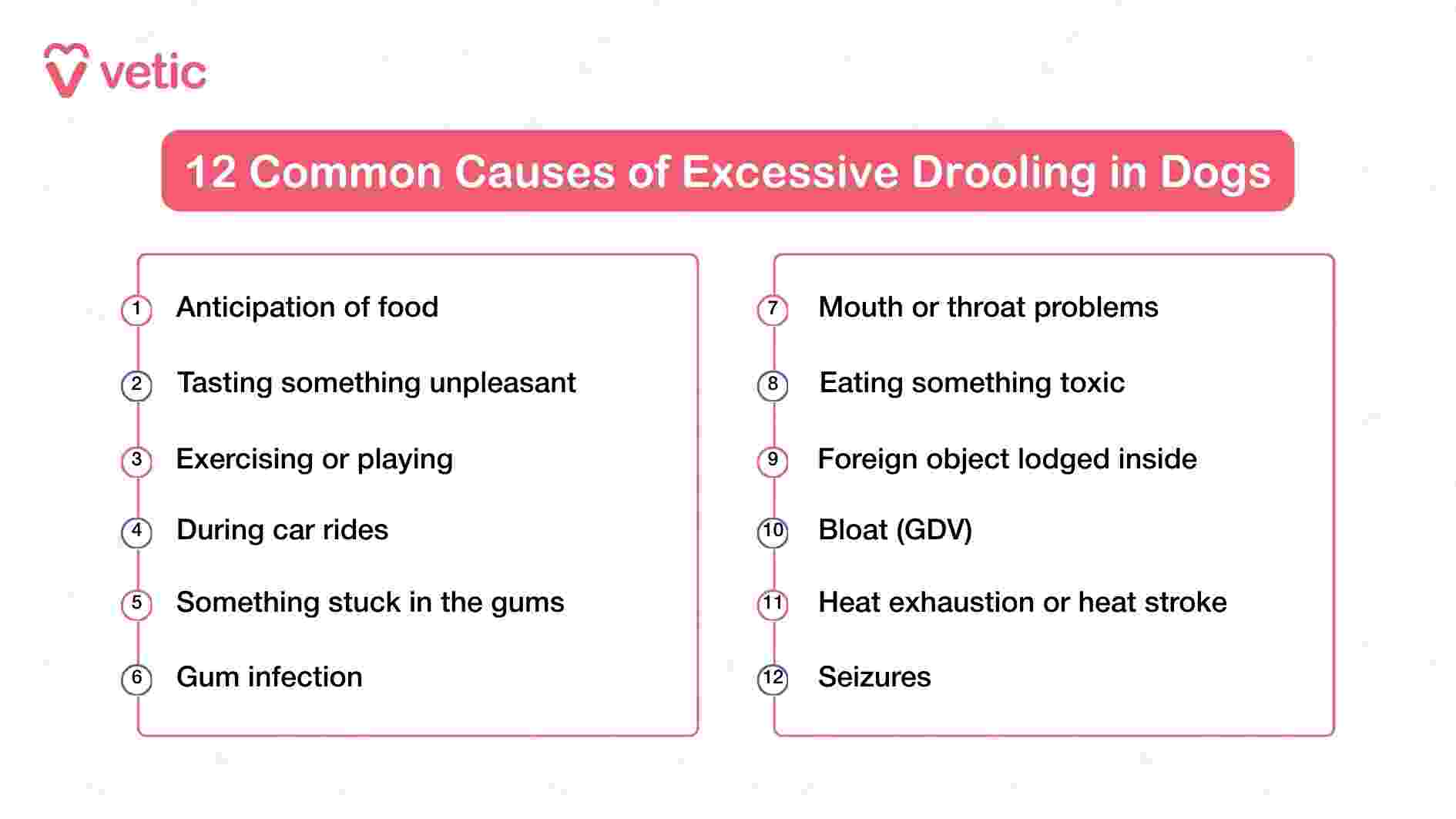
1. Can Anticipation of Food Cause My Dog to Drool More?
Yes, the sight or smell of food often triggers an instant salivary response. Whether it’s chicken biryani, pizza, or your dog’s kibble, the anticipation of a treat can make any dog drool.
This is a completely normal dog drooling cause and requires no treatment.
2. Why Does My Dog Drool After Tasting Something Unpleasant?
Dogs may drool excessively after tasting bitter medications, deworming tablets, or supplements.
It’s their way of flushing out the unpleasant taste. The drooling usually stops within minutes once the bitterness wears off.
3. Does Exercising or Playing Make Dogs Drool More?
Yes. Physical activity raises a dog’s body temperature, and drooling helps them cool down.
Mild drooling during or after a play session is natural. However, excessive drooling combined with panting or lethargy could suggest overheating, especially in India’s hot, humid months.
4. Why Do Some Dogs Drool During Car Rides?
Many dogs drool excessively during travel due to motion sickness or anxiety. The constant movement, unfamiliar smells, and excitement can trigger nausea.
If your dog drools in car rides, consult your vet — they can prescribe mild anti-nausea medication or recommend crate training for comfort.
When Should I Be Worried That My Dog’s Excessive Drooling Is a Health Emergency?
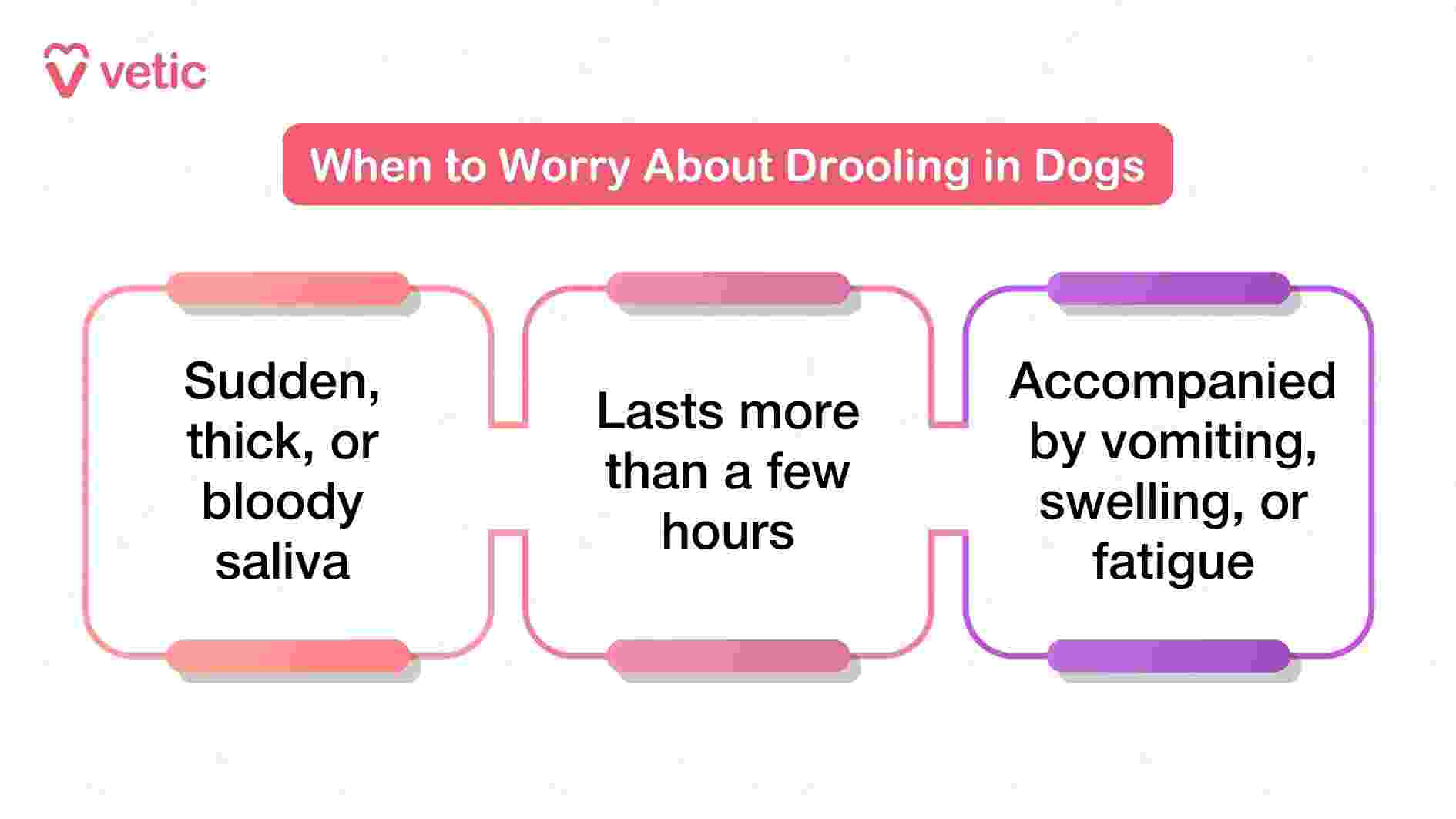
If drooling appears suddenly, lasts for hours, or is accompanied by vomiting, swelling, bad breath, or behavioural changes, it may be a sign of illness.
Let’s look at the most serious emergency dog drooling causes you should know about.
5. Could Something Stuck in My Dog’s Gums Cause Drooling?
Yes. Dogs who chew toys, bones, or sticks can get foreign objects lodged in their gums or between teeth.
They may paw at their mouth, refuse to close it, or have thick drool. If you can safely see and remove the object, do so gently. If not, visit your vet immediately to avoid choking or infection.
6. How Does Gum Infection Lead to Excessive Drooling in Dogs?
Dog drooling and gum disease go hand in hand. Conditions like gingivitis and periodontitis cause inflammation, pain, and bad breath (halitosis).
Signs include:
- Red or swollen gums
- Foul smell
- Visible tartar buildup
- Reduced appetite or chewing on one side
Regular dental cleanings and vet check-ups can prevent these dog mouth infection symptoms before they cause severe discomfort.
7. Can Mouth or Throat Problems Cause My Dog to Drool Excessively?
Yes. Older dogs often develop mouth ulcers, broken teeth, or benign growths that cause drooling mixed with blood. These issues may arise overnight and worsen quickly.
Only a veterinarian can diagnose and treat these problems; antibiotics or surgery may be needed depending on the cause.
8. Is Drooling a Sign That My Dog Ate Something Toxic?
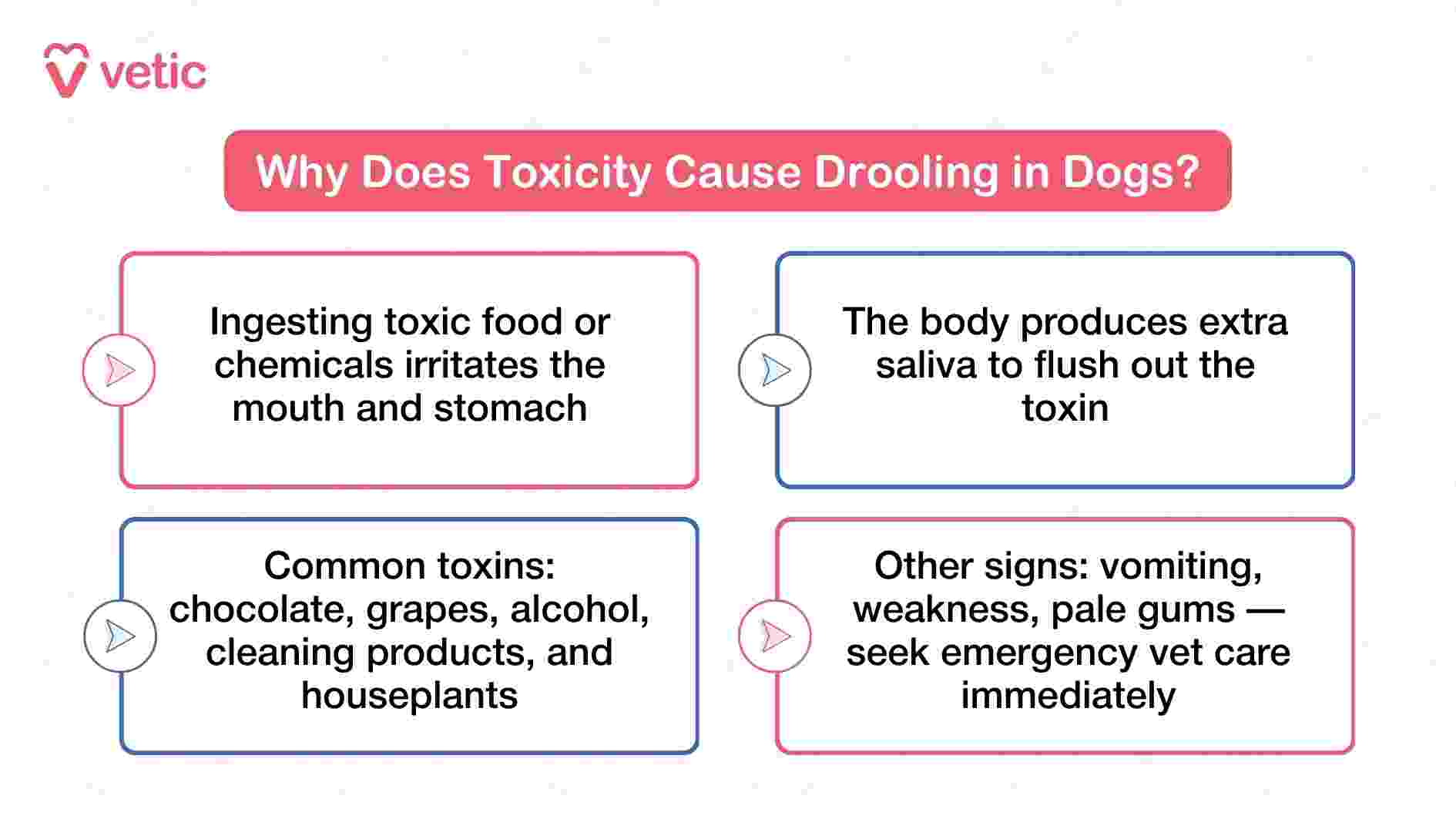
Unfortunately, yes. Dog drooling after eating something toxic is one of the first signs of poisoning.
Common toxins include:
- Chocolate, caffeine, or alcohol
- Grapes and raisins
- Bleach, floor cleaners, or toilet disinfectants
- Houseplants like aloe, ivy, or chrysanthemum
Other signs: vomiting, restlessness, and pale gums.
This is an emergency rush to your nearest veterinary hospital for immediate treatment.
9. What Happens If My Dog Has Foreign Objects Lodged in Their Throat or Stomach?
Ingesting toys, fabric, or bones can cause obstruction and excessive salivation in dogs. Your dog may gag, drool, or vomit repeatedly.
Vets use X-rays or ultrasounds to locate and remove the object — sometimes through surgery. Do not try to make your dog vomit at home; it can worsen the blockage.
10. How Are Bloat and GDV Related to Drooling in Dogs?
Bloat and Gastric Dilatation-Volvulus (GDV) are life-threatening emergencies where the stomach twists.
Apart from heavy drooling, symptoms include:
- Distended, tight abdomen
- Restlessness or dry retching
- Rapid breathing or pale gums
Large-chested breeds like Great Danes, Boxers, and Dobermans are most at risk.
Immediate emergency care is vital — delay can be fatal.
11. Can Heat Exhaustion or Heat Stroke Cause My Dog to Drool Excessively?
Yes. In India’s summer months, heat exhaustion and heat stroke are common. Signs include:
- Panting and bright red or pale gums
- Dry nose and dehydration
- Lethargy, staggering, or confusion
Move your dog to a cool area, offer water, and call your vet. Severe heatstroke can cause dog drooling and vomiting, requiring fluid therapy.
12. Do Seizures Cause Excessive Drooling in Dogs?
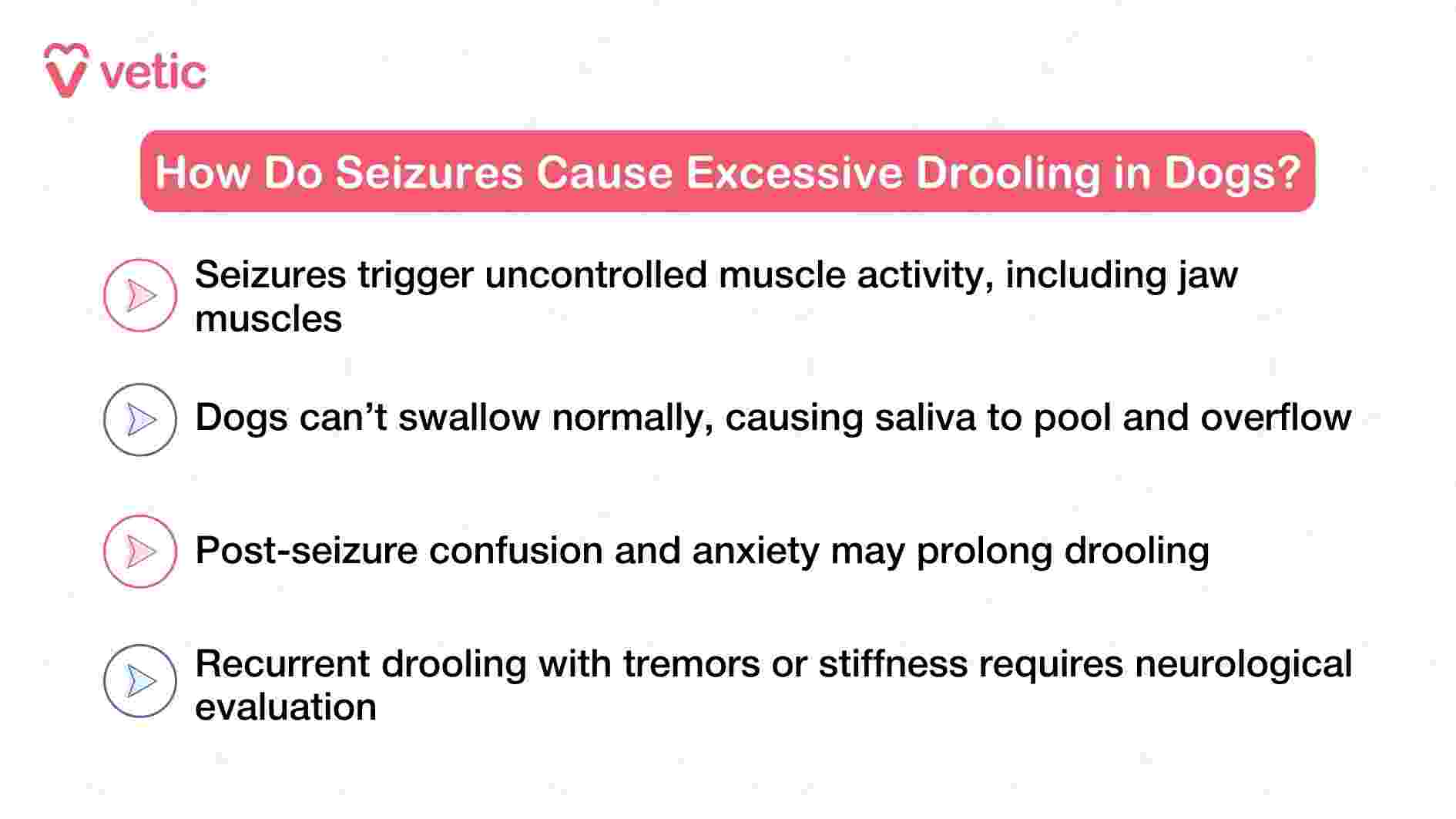
Yes. Seizures, whether full-body or partial, often lead to uncontrollable drooling. After a seizure, dogs may appear disoriented or scared.
If you notice repeated drooling episodes with tremors or stiffness, consult a vet for a neurological exam and medication.
What Are the Most Common Reasons My Dog Might Drool Excessively?
To summarize, dog drooling causes range from mild to life-threatening. Normal causes include excitement, food anticipation, or heat.
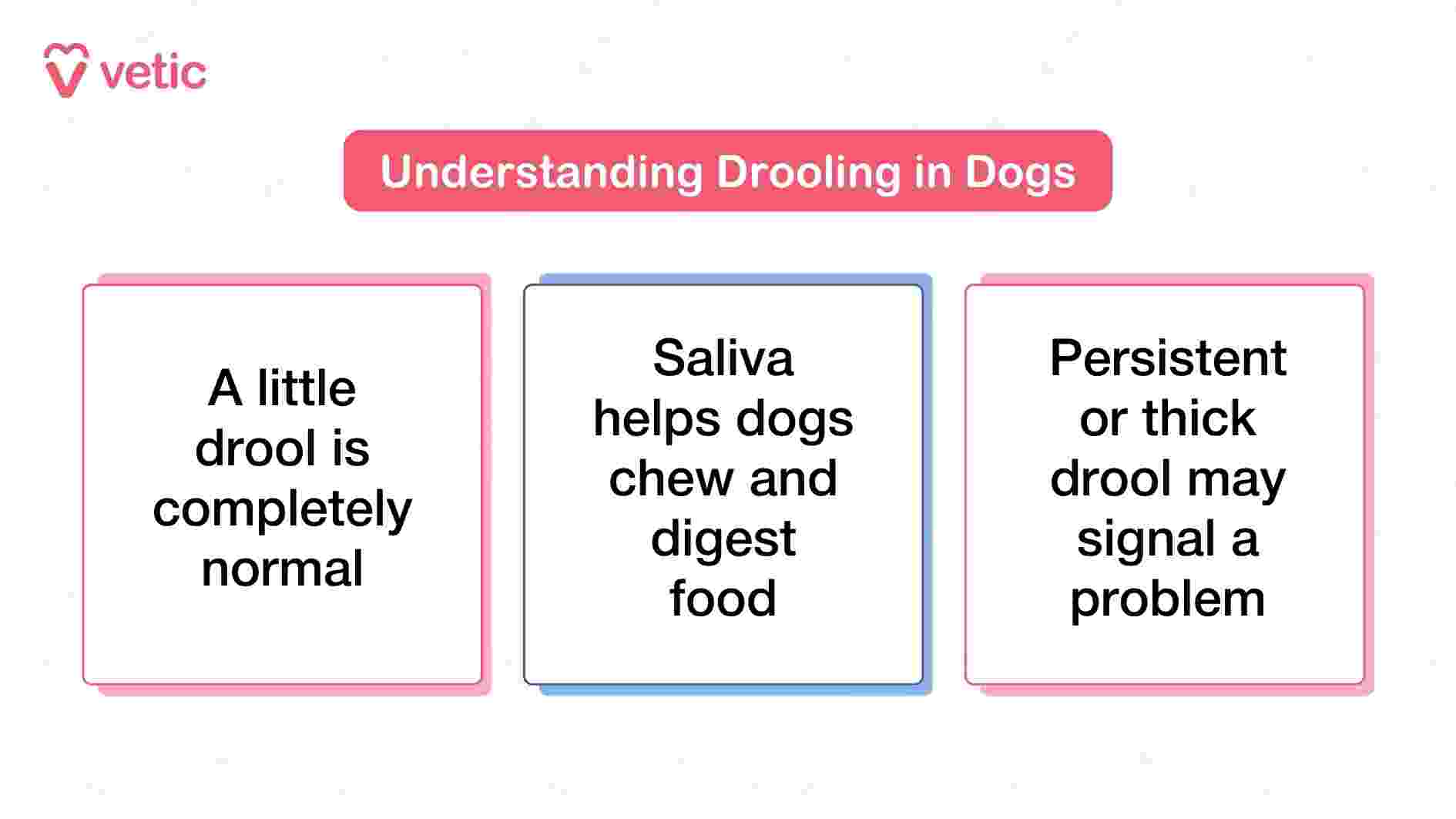
Abnormal drooling happens due to:
- Gum or mouth infections
- Toxin ingestion
- Heatstroke or bloat
- Seizures or stomach obstruction
Always monitor accompanying symptoms to decide when to act.
What Should I Do If My Dog Is Drooling Excessively?
What First Aid Can I Provide at Home for Mild Drooling in Dogs?
- Keep your dog calm and cool
- Wipe drool and check their mouth for foreign objects
- Offer clean, fresh water
- Avoid giving human medication
- Track if drooling stops within an hour or two
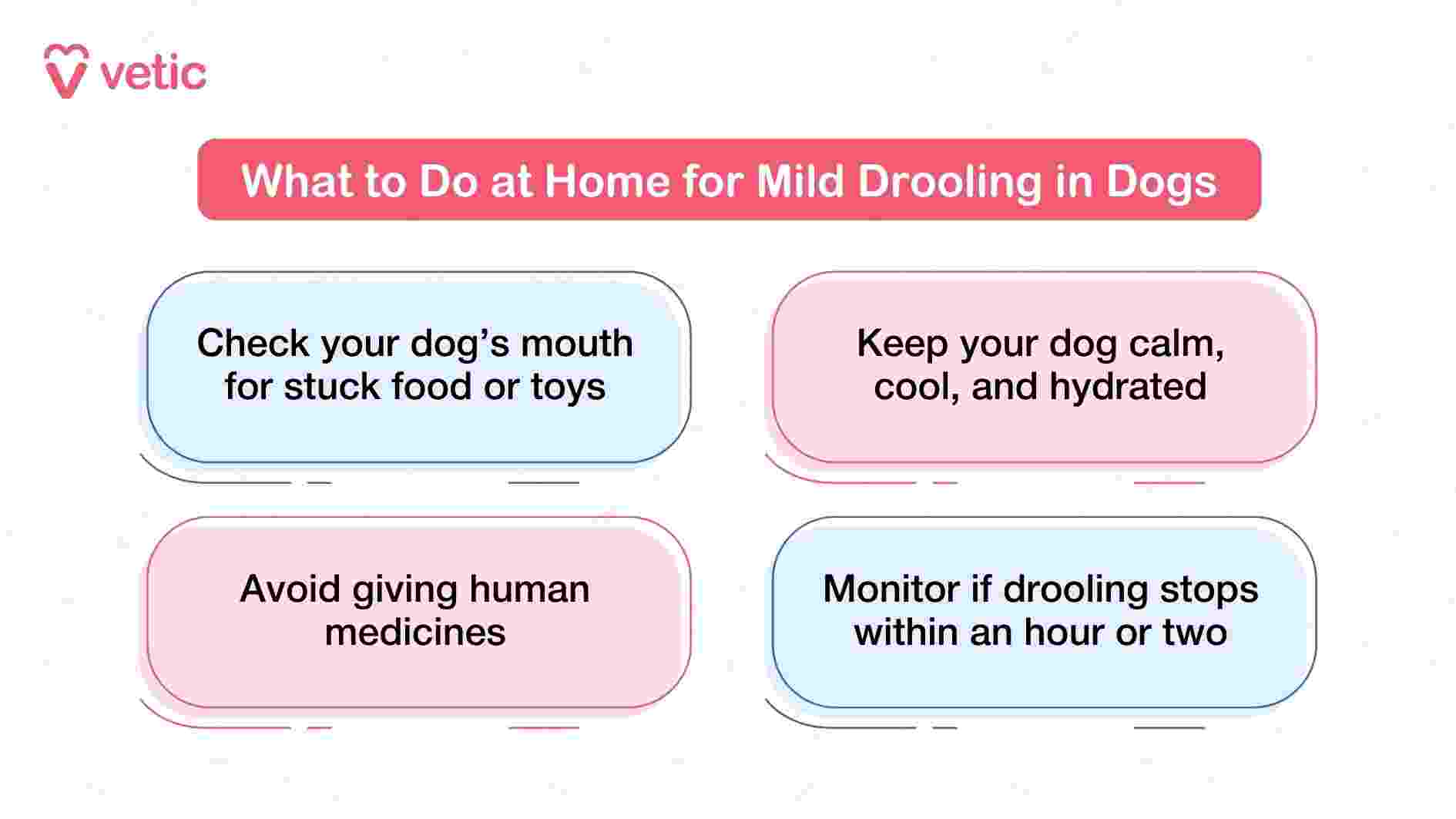
When Should I Seek Veterinary Care for Severe Drooling?
- Drooling persists beyond a few hours
- There’s blood, swelling, or foul smell
- Accompanied by vomiting, panting, or weakness
- Gums turn pale or bright red
- Your dog appears restless or unable to lie down
If you notice any of these, reach your nearest veterinary emergency clinic, preferably one with in-house diagnostics.
Why Is My Dog Drooling Excessively? What Can I Do About It?
A bit of drool is a sign of a happy, healthy dog — especially if they’re excited, playful, or hungry. But when drooling becomes excessive, smelly, or paired with other symptoms, it’s time to act fast.
From gum infections to poisoning and heatstroke, drooling can be your pet’s way of asking for help.
Regular dental care, avoiding toxins, and watching for warning signs will keep your dog comfortable and safe.
FAQs about Dog Drooling Excessively
What’s the difference between normal and abnormal drooling in dogs?
Normal drooling happens with food, excitement, or heat. Abnormal drooling includes thick, bloody, or persistent saliva with other symptoms.
Which dog breeds drool the most?
Saint Bernards, Bulldogs, Boxers, Mastiffs, and Great Danes are known for constant drooling due to their loose lips and jowls.
Can dental problems cause excessive drooling?
Yes. Gum infections, tooth decay, or oral injuries often lead to pain and excessive salivation.
My dog drools during car rides — should I worry?
Not usually. It’s often motion sickness or anxiety. Try short rides or vet-recommended travel tablets.
Can heat make my dog drool more?
Yes. Dogs pant and drool more in hot, humid weather to regulate body temperature.
What should I do if my dog ate something toxic and is drooling?
Don’t wait. Go to a vet immediately — early treatment prevents poisoning complications.
How can I stop my dog from drooling excessively?
You can’t stop natural drooling, but regular dental care, hydration, and avoiding toxins help reduce abnormal salivation.
References:
Boonsriroj, H., Manalo, D. L., Kimitsuki, K., Shimatsu, T., Shiwazaki, N., Takahashi, Y., Tanaka, N., & Inoue, S. (2015). A pathological study of the salivary glands of rabid dogs in the Philippines. Virus Research, 208, 60-66. https://doi.org/10.1016/j.virusres.2015.02.010 PMC
Kim, S., (2013). Hypersialism – an overview. In Canine and Feline Gastroenterology. Elsevier. Retrieved from https://www.sciencedirect.com/topics/veterinary-science-and-veterinary-medicine/hypersalivation ScienceDirect
VCA Animal Hospitals. (n.d.). Dealing with drooling. Retrieved from https://vcahospitals.com/know-your-pet/dealing-with-drooling Vca

